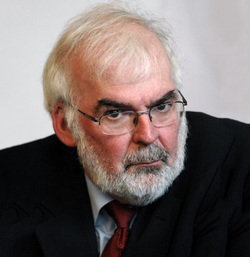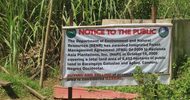
“Domestic resources from African countries have to be supplemented by European resources, and that has to mean the private sector,” says Tom Arnold, who chairs the European Commission and African Union's joint Rural Taskforce.
Bridging African agriculture’s financing gap
By Benjamin Fox
The European Commission and African Union set up a joint rural Africa taskforce in May, after agricultural co-operation was one of the key topics as the EU-Africa summit in Abidjan in November 2017.
The task force and its 11 experts were tasked with making recommendations in January 2019, with a mandate that focuses on promoting food security, transferring skills, climate change adaption and investment in agri-business.
The International Food Policy Research Institute estimates that Africa will add 38 million to its number of hungry people by 2050 as a result of climate change. The Institute has also forecast that the continent will experience major food shortages by 2020 and beyond, while malnutrition will be on the rise over the next 20 years.
Carlos Lopes, the AU’s High Representative on the post-Cotonou talks, told EURACTIV that the planned African Continent Free Trade Agreement (ACFTA) would drive the integration in African value chains that will solidify the industry, and allow African agriculture to serve a mass market.
But all of that will require a rapid ramping up of investment, both public and private, in African agri-business.
The lack of domestic processing means that African countries often find themselves exporting raw materials, whether commodities or produce, and then importing the finished product.
“If you look at what is available, a lot is still imported…even coffee, which is the country’s main export, it’s all pure green bean exports, we need to get more investment into processing,” Erik Habers, the head of development co-operation at the EU’s delegation to Ethiopia, told EURACTIV.
“We are looking more at the linkages between smallholders, co-operatives, the private sector, processing, this whole value chain discussion,” he added.
Indeed, it is driving investment and access to finance that is the main barrier to African agriculture, and development finance institutions have vowed to step up their market-making efforts since fewer than 15% of lenders in Africa are offering services to agri-business and smallholders.
In regions such as sub-Saharan Africa, smallholder farmers typically farming less than two acres produce 70% of the total food consumed. But it is effective. Economic growth in agriculture is up to 11 times as effective at reducing poverty as growth in other sectors.
The EU’s External Investment Plan – potentially worth up to €44 billion – promises to focus on supporting agri-businesses, while the African Development Bank is investing $24 billion in African agriculture over the next 10 years as part of its ‘Feed Africa’ strategy launched in 2015.
“Domestic resources from African countries have to be supplemented by European resources, and that has to mean the private sector,” says Tom Arnold, who chairs the Rural Taskforce.
But that is just a start. The financial sector meets less than 3% of total smallholder demand for financing, estimated at $450 billion.
Donors and development finance institutions have been looking at ways to make crop insurance schemes more attractive financially. The One Acre Fund and Juhudi Kilimo are among the successful recent micro-finance firms in the East African market, but the surface has barely been scratched.
“Agriculture is the main engine for transforming the economy of Africa. We want to unlock those challenges in terms of food security, land degradation, poverty and trade,” Josefa Sacko, the AU’s Commissioner for Rural Economy and Agriculture, told EURACTIV at the launch of the Rural Africa Taskforce.
The question is how Africa, through its own efforts and increasingly with more support from Europe, can put this into practice.













